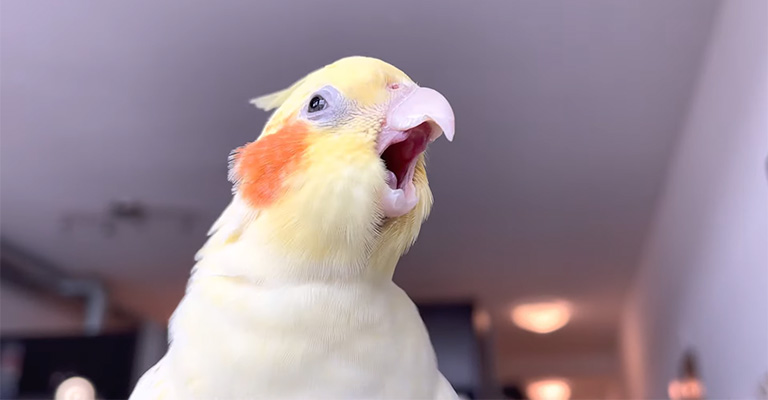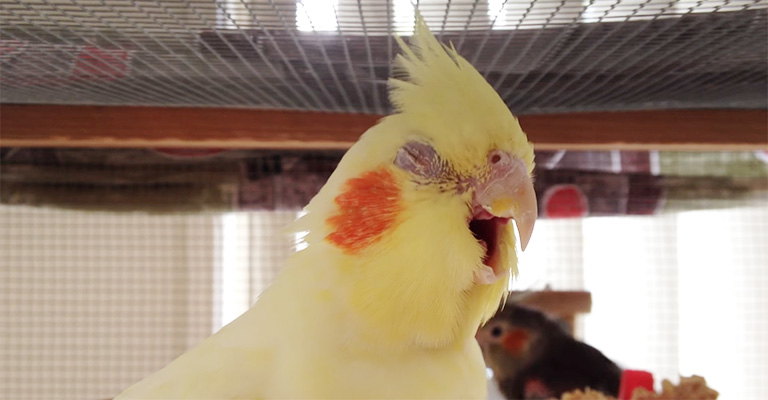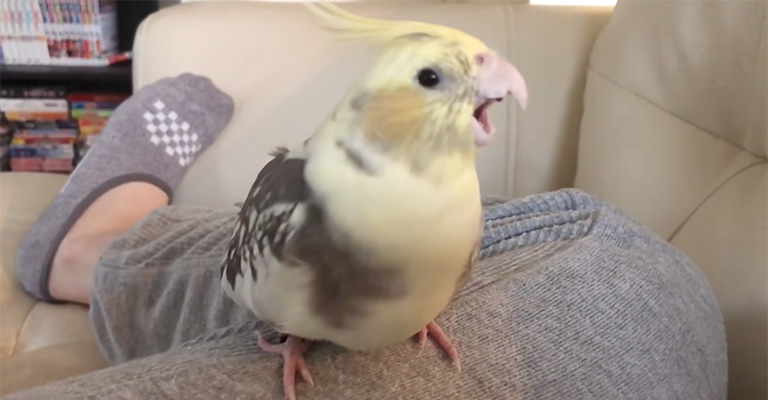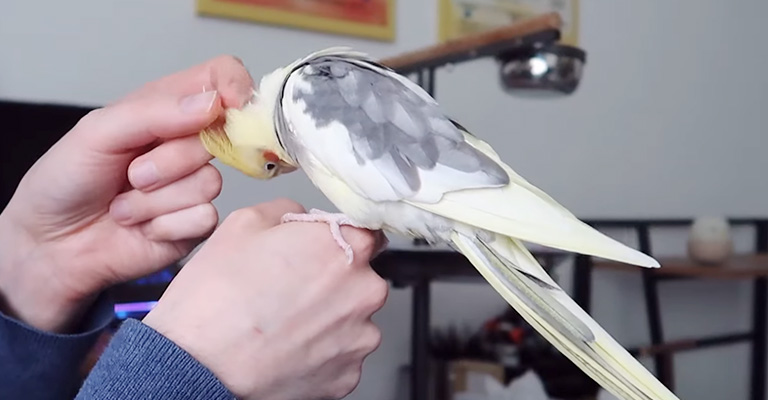Cockatiels are adorable and intelligent birds that make great companions for many people. They have a lot of personality and can communicate with their owners in various ways, such as vocalizing, mimicking, and displaying body language.
One of the expected behaviours that cockatiels exhibit is yawning. But why do they do it? Is it a sign of something good or bad? How can you tell the difference?
This article will explore the possible reasons why your cockatiel keeps yawning, how to identify the underlying cause, and what to do if you suspect a problem. We will also provide frequently asked questions and elaborate conclusions to help you better understand your feathered friend.

What Does Yawning Mean in Cockatiels?
Yawning is a natural and expected behaviour in cockatiels, as well as in many other animals. It is a reflex action that involves opening the mouth wide and inhaling deeply, followed by exhaling slowly. Yawning can serve different purposes depending on the context and the individual bird.
Some of the common reasons why cockatiels yawn is:
Tiredness
Like humans, cockatiels yawn when sleepy or bored. Yawning helps them to stretch their muscles, increase their oxygen intake, and prepare for rest. You may notice your cockatiel yawning more often at night or during nap time.
Stress

Cockatiels can also yawn when stressed or anxious. Yawning can be a way of coping with unpleasant situations, such as loud noises, unfamiliar people, or changes in the environment. Yawning can signify submission or appeasement when faced with a dominant or aggressive bird.
Happiness
Contrary to what you might think, cockatiels can also yawn when happy and relaxed. Yawning can express contentment and satisfaction, especially after a good meal, an excellent grooming session, or a cuddle with their owner. Some cockatiels may even yawn when they see their favourite person or toy.
Contagiousness
Another compelling reason why cockatiels yawn is that others influence them. Yawning can be contagious among birds and between birds and humans. If your cockatiel sees you or another bird yawning, they may imitate the behaviour out of curiosity or empathy.
When Should You Worry About Your Cockatiel’s Yawning?

While yawning is usually harmless and normal in cockatiels, there are some cases where it can indicate a problem. If your cockatiel’s yawning is excessive, frequent, or accompanied by other symptoms, you should pay attention and consult a vet if necessary.
Some of the possible causes of abnormal yawning in cockatiels are:
Obstruction
Sometimes, your cockatiel may yawn because they have something stuck in its throat or crop, such as food, seeds, feathers, or foreign objects.
This can cause discomfort, pain, difficulty breathing, and choking. Your cockatiel may yawn repeatedly and shake its head to dislodge the obstruction.
If this happens, you should offer cockatiel water and avoid touching their throat or crop. If the block persists or worsens, you should seek veterinary help immediately.
Infection

Infection is another severe cause of yawning in cockatiels. Your cockatiel may have an infection in its ears, sinuses, mouth, throat, or respiratory system that causes inflammation, irritation, discharge, and pain. Your cockatiel may yawn to relieve the pressure or discomfort in these areas.
You may also notice other signs of infection, such as sneezing, coughing, wheezing, nasal discharge, eye discharge, swelling, redness, loss of appetite, lethargy, or fever. If you suspect an infection in your cockatiel, you should immediately take them to a vet for diagnosis and treatment.
Allergy
Allergy is another possible cause of yawning in cockatiels. Your cockatiel may be allergic to something in its environment or diet that triggers an immune response and causes inflammation, irritation, itching, and sneezing.
Your cockatiel may yawn to soothe its throat or clear its nasal passages. You may also notice other signs of allergy, such as scratching, plucking, rashes, hives, vomiting, diarrhoea, or anaphylaxis.
If you suspect an allergy in your cockatiel, you should try to identify and eliminate the allergen and consult a vet for advice and medication.
How to Prevent and Treat Yawning in Cockatiels?

The best way to prevent and treat yawning in cockatiels is to provide them with a healthy and comfortable environment and diet.
Here are some tips to follow:
Provide Adequate Sleep
Cockatiels need about 10 to 12 hours of uninterrupted sleep every night to maintain their health and well-being. You should provide your cockatiel with a dark, quiet, and cozy place to sleep, such as a cage covered with a cloth or a nest box. You should also avoid disturbing your cockatiel during their sleep time and respect their natural circadian rhythm.
Reduce Stress
Cockatiels are sensitive and social birds that can easily get stressed by various factors, such as noise, strangers, predators, or changes. It would help if you tried to minimize the sources of stress for your cockatiel and provide them with a safe and stable environment.
It would be best to offer your cockatiel plenty of mental and physical stimulation, such as toys, games, music, or interaction with you or other birds. You should also avoid forcing your cockatiel to do something they don’t like or punishing them for their behaviour.
Ensure Proper Hygiene
Cockatiels are prone to various infections that can cause yawning and other problems. You should always keep your cockatiel’s cage, food, water, and accessories clean and fresh.
It would help if you also groomed your cockatiel regularly by trimming its nails, beak, and feathers and bathing them with water or a bird-safe spray. You should also monitor your cockatiel’s health and behaviour and check for signs of illness or injury.
Feed a Balanced Diet
Cockatiels need a balanced and varied diet that meets their nutritional needs and preferences. It would be best to feed your cockatiel a high-quality pellet or seed mix containing all the essential vitamins, minerals, and amino acids.
It would be best to supplement their diet with fresh fruits, vegetables, grains, nuts, and safe and suitable treats for cockatiels.
You should avoid feeding your cockatiel anything toxic or harmful to them, such as chocolate, avocado, onion, garlic, salt, sugar, alcohol, or caffeine.
Frequently Asked Questions
Your cockatiel may yawn when you yawn because you influence them. Yawning can be contagious among birds as well as between birds and humans. If your cockatiel sees you yawning, it may imitate the behaviour out of curiosity or empathy. This can signify social bonding and communication between you and your cockatiel. It can also be a sign of synchronization or synchronization between you two.
Your cockatiel may yawn when they are happy because they are relaxed and content. Yawning can express their happiness and satisfaction, especially after a good meal, an excellent grooming session, or a cuddle with their owner. Some cockatiels may even yawn when they see their favourite person or toy.
Your cockatiel may yawn when stressed because they are tired or anxious. Yawning can be a way of coping with unpleasant situations, such as loud noises, unfamiliar people, or changes in the environment. Yawning can signify submission or appeasement when faced with a dominant or aggressive bird.
Conclusion
Yawning is a typical and expected behaviour in cockatiels that can have different meanings depending on the context and the individual bird.
Yawning can indicate tiredness, stress, happiness, or contagiousness in cockatiels. However, yawning can also indicate obstruction, infection, or allergy in some cases.
You should observe your cockatiel’s yawning patterns and frequency and look for other symptoms or signs of trouble. If you suspect a problem, you should consult a vet as soon as possible and provide your cockatiel with the best care and treatment.
By understanding why your cockatiel keeps yawning, you can better understand your feathered friend and strengthen your bond with them.
Yawning can be a way of communicating and expressing emotions between you and your cockatiel. You should appreciate and enjoy this unique behaviour of your cockatiel and yawn back at them if you feel like it.